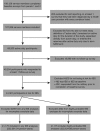The Epidemiology of Irritable Bowel Syndrome in the US Military: Findings from the Millennium Cohort Study
- PMID: 26729548
- PMCID: PMC4759150
- DOI: 10.1038/ajg.2015.386
The Epidemiology of Irritable Bowel Syndrome in the US Military: Findings from the Millennium Cohort Study
Abstract
Objectives: Functional gastrointestinal disorders occur more frequently among deployed veterans, although studies evaluating the relative impact of risk factors, including stress and antecedent infectious gastroenteritis (IGE), are limited. We examined risk factors for new-onset irritable bowel syndrome (IBS) among active duty participants in the military's Millennium Cohort Study.
Methods: Medical encounter data from 2001 to 2009, limited to Cohort members on active duty, were used to identify incident IBS cases (any and highly probable). IGE was identified using medical encounter or self-report. Covariate data were obtained from the Millennium Cohort Study surveys and analyzed using Cox proportional hazards methods.
Results: Overall, 41,175 Cohort members met the eligibility criteria for inclusion and 314 new-onset cases of IBS were identified among these. Significant risk factors (adjusted hazard ratio, 95% confidence interval) included antecedent IGE (2.05, 1.53-2.75), female gender (1.96, 1.53-2.52), number of life stressors (1: 1.82, 1.37-2.41; 2: 2.86, 2.01-4.06; 3+: 6.69, 4.59-9.77), and anxiety syndrome (1.74, 1.17-2.58). Limited to highly probable IBS, a stronger association with antecedent IGE was observed, particularly when based on medical encounter records (any IGE: 2.20, 1.10-4.43; medical encounter IGE only: 2.84, 1.33-6.09). Precedent anxiety or depression and IGE interacted with increased IBS risk compared with IGE alone.
Conclusions: These results confirm previous studies on the association between sociodemographic or life stressors and IBS. IGE was significantly associated with IBS risk. Whether deployed or not, US service members often encounter repeated exposure to high levels of stress, which, combined with other environmental factors such as IGE, may result in long-term debilitating functional gastrointestinal disorders.
Figures
References
-
- 1Hungin AP, Chang L, Locke GR et al. Irritable bowel syndrome in the United States: prevalence, symptom patterns and impact. Aliment Pharmacol Ther 2005;21:1365–1375. - PubMed
-
- 3Gralnek IM, Hays RD, Kilbourne A et al. The impact of irritable bowel syndrome on health-related quality of life. Gastroenterology 2000;119:654–660. - PubMed
Publication types
MeSH terms
LinkOut - more resources
Full Text Sources
Other Literature Sources
Medical
Miscellaneous


